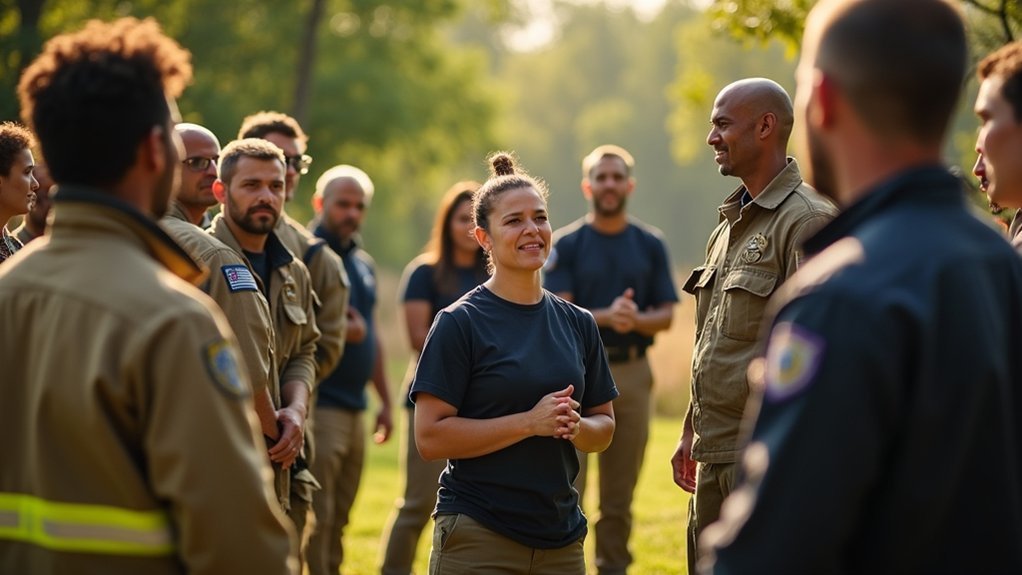First responders experience cumulative stress at rates three times higher than the general population, yet many lack thorough mental health support. You’ll find that resilience training isn’t just another workplace program—it’s a critical lifeline for professionals constantly exposed to traumatic situations. These targeted interventions can dramatically transform how emergency personnel manage psychological challenges. If you’re wondering how structured emotional strategies might prevent burnout and protect critical frontline workers, you’ll want to understand the groundbreaking approaches reshaping mental wellness in high-pressure professions.
Key Takeaways
- Comprehensive resilience training programs address mental health challenges by integrating mind skills, emotional regulation techniques, and stress management strategies.
- Interactive and flexible training formats, including role plays and video discussions, enhance engagement and learning for first responders across different roles.
- Targeted programs focus on building psychological fortitude, providing practical tools for managing acute stress and overcoming professional and personal adversities.
- Evidence-based training initiatives have demonstrated significant improvements in mental health, with over 70,000 first responders reporting positive psychological outcomes.
- Long-term resilience development aims to reduce physiological stress responses and cultivate self-sustaining coping mechanisms for sustained professional effectiveness.
Understanding the Unique Challenges of First Responders

While first responders play a vital role in protecting and serving communities, they face unprecedented mental health challenges that set them apart from other professional sectors. The demanding nature of their work exposes them to high-stress situations and traumatic events that can greatly impact their mental health and wellness. You’ll encounter unique psychological risks, including heightened vulnerability to PTSD, anxiety, and depression, stemming from continuous exposure to vital incidents and life-or-death scenarios. Long shifts, emotional exhaustion, and complex decision-making further compound these challenges. Research demonstrates that up to 30% of first responders experience mental health symptoms, underscoring the urgent need for targeted support and resilience strategies. Understanding these distinctive occupational stressors is essential for developing effective interventions that protect and sustain the psychological well-being of these essential professionals.
Core Components of Effective Resilience Training

Because resilience is a multifaceted skill critical to first responders‘ psychological survival, effective training programs must strategically integrate detailed, research-driven approaches that address the complex mental health challenges inherent in emergency response work.
You’ll find that extensive resilience training for first responders encompasses mind skills, energy management techniques, and connection strategies. Interactive training formats like role plays and video discussions facilitate your active engagement with practical stress management tools. The programs are designed to be flexible, accommodating various ranks and roles within emergency service agencies.
These evidence-based resilience training interventions have demonstrated significant impact, with over 70,000 first responders globally reporting improved mental health and stress coping capabilities. By focusing on physiological, psychological, and emotional skill development, you’ll be better prepared to navigate the intense challenges of your critical profession.
Mental Health Strategies for High-Stress Professionals

Mental health strategies for high-stress professionals must address the unique psychological demands faced by first responders, who routinely encounter traumatic and emotionally challenging situations. Resilience training provides critical mental health interventions designed to support their psychological well-being.
Key strategies include:
- Developing adaptive coping mechanisms through targeted mind skills
- Learning emotional regulation techniques to manage acute stress responses
- Practicing self-care and energy management strategies
- Building robust interpersonal connection skills to reduce professional isolation
Research demonstrates that systematic resilience training can notably mitigate psychological strain, enabling first responders to maintain emotional equilibrium and professional effectiveness. By integrating evidence-based mental health approaches, these programs equip professionals with practical tools to navigate high-pressure environments while preserving their psychological integrity and overall wellness.
Building Emotional Strength Through Targeted Programs

As first responders face increasingly complex emotional challenges, targeted resilience training programs have emerged as a critical intervention for building psychological fortitude. You’ll discover that these programs equip you with essential mind, energy, and connection skills designed to manage stress effectively. By participating in resilience training, you’ll learn practical tools for overcoming adversity in both professional and personal landscapes.
Scientific evidence demonstrates that such programs greatly reduce physiological and psychological stress, helping you develop emotional strength. The training doesn’t just focus on individual coping mechanisms; it also emphasizes building a supportive culture among first responders. You’ll benefit from peer connections that enhance your emotional resilience, ultimately improving your mental health and professional performance in high-pressure environments.
Long-Term Impact of Resilience Development Initiatives

When examining the transformative potential of resilience development initiatives, research reveals profound long-term impacts for first responders that extend far beyond immediate stress management. Resilience training programs have demonstrated substantial benefits in equipping professionals with sustainable wellness strategies.
Resilience training transforms first responders’ long-term wellness through strategic, sustainable professional development strategies.
Key long-term outcomes include:
- Reduced physiological stress responses among first responders
- Enhanced adaptability to high-pressure professional environments
- Improved overall psychological and physical health metrics
- Development of self-sustaining coping mechanisms
You’ll find that these initiatives aren’t just temporary interventions but thorough approaches to professional well-being. By investing in resilience training, first responders gain critical tools for managing complex emotional and psychological challenges. The research underscores that such programs aren’t merely supportive—they’re essential for maintaining the mental health and operational effectiveness of those who consistently confront high-stress situations in service to their communities.
Frequently Asked Questions
What Is the First Response Resiliency Program?
You’ll find the First Response Resiliency Program offers critical emotional support and stress management training for first responders, scientifically addressing trauma’s impact while empowering professionals to build mental resilience and wellness through thorough, compassionate educational resources.
What Are Resilience Training Programs?
Resilience training programs are compassionate lifelines for those steering through life’s storms, helping you develop mental toughness and stress management skills that transform challenges into opportunities for growth and personal strength.
What Kind of Training Do First Responders Need?
You’ll need extensive training focused on emotional intelligence and stress management, equipping you with practical tools to navigate high-pressure environments, process traumatic experiences, and maintain mental resilience throughout your challenging professional journey.
What Are the Six Types of First Responders?
Like guardians standing watch, you’ll encounter six lifelines: police officers, firefighters, EMTs, paramedics, dispatchers, and search and rescue teams—each uniquely trained in emergency medical skills and firefighters’ resilience to protect communities during critical moments.
Conclusion
You’re more than a first responder; you’re a lighthouse guiding others through life’s stormiest moments. By embracing resilience training, you’ll forge an unbreakable shield of emotional strength, transforming challenges into opportunities for growth. Like a Phoenix rising from intense flames, you’ll develop the mental fortitude to navigate high-stress environments, ensuring not just professional excellence, but personal well-being and sustainable compassion.



